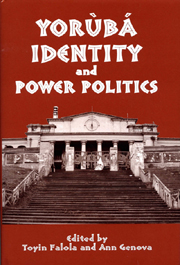Book contents
- Frontmatter
- Contents
- List of Illustrations
- Introduction
- Part I Writing Yorùbá
- Part II Chiefs and Tradition
- 8 Power, Status, and Influence of Yorùbá Chiefs in Historical Perspective Toyin Falola
- 9 Chieftaincy Structures, Communal Identity, and Decolonization in Yorùbáland
- 10 Odogbolu Chieftaincy Dispute in Historical Perspective
- 11 Yorùbá Nationalism and the Reshaping of Ọbaship
- Part III Identity and Modern Politics
- Notes on the Contributors
- Index
9 - Chieftaincy Structures, Communal Identity, and Decolonization in Yorùbáland
from Part II - Chiefs and Tradition
Published online by Cambridge University Press: 12 September 2012
- Frontmatter
- Contents
- List of Illustrations
- Introduction
- Part I Writing Yorùbá
- Part II Chiefs and Tradition
- 8 Power, Status, and Influence of Yorùbá Chiefs in Historical Perspective Toyin Falola
- 9 Chieftaincy Structures, Communal Identity, and Decolonization in Yorùbáland
- 10 Odogbolu Chieftaincy Dispute in Historical Perspective
- 11 Yorùbá Nationalism and the Reshaping of Ọbaship
- Part III Identity and Modern Politics
- Notes on the Contributors
- Index
Summary
Historians of Africa generally agree that indigenous political structures (chieftaincy institutions) were central to the strategies of governance in colonial Yorùbáland. Although British colonial rule distorted chieftaincy structures, powerful ọbas (monarchs), baalẹs (head chiefs), and Western-educated elites still managed to effectively deploy local political forces to advance their political status in a rapidly shifting colonial context. This dynamic political relationship among ọbas, chiefs, British administrators, and an emergent indigenous Western-educated elite was complicated by the new emphasis on development, democracy, and modern governance that nationalist elites insisted on during the late colonial period. Analyzed in the context of the political configurations that emerged under the indirect rule system and the unfolding drama of an emergent post-colonial Nigerian state, I seek to critically discuss the following major themes in Yorùbá politics during the decolonization process: traditional political authorities and the imperative of institutional transformation; chieftaincy politics and communal identity; and chieftaincy structures, state formation, and the construction of a Yorùbá ethnic identity. Thus, this chapter contends that interpretations of traditional political authorities, along with the underlying neo-traditional character of local communities, the pressing demands of a Yorùbá nationalist elite for development and modern governance, and the structural imbalance that emerged in the terminal years of colonial rule, transformed Yorùbá collective political action during the decolonization process.
Overall, this chapter seeks to analyze the critical intersection between the shifting interpretations of traditional political authorities and the construction of communal identity in Yorùbá politics during the important historical moment of decolonization.
- Type
- Chapter
- Information
- Yorùbá Identity and Power Politics , pp. 177 - 191Publisher: Boydell & BrewerPrint publication year: 2006



